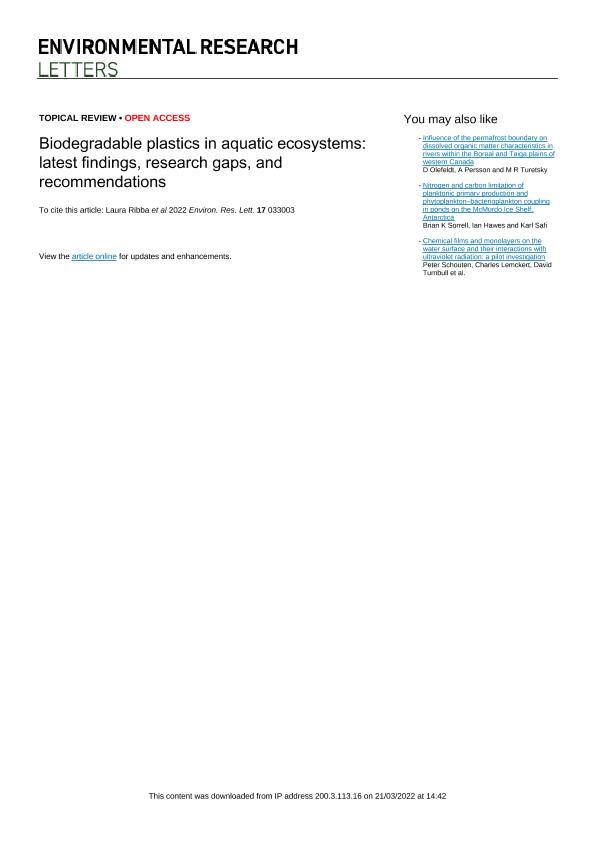Artículo
Biodegradable plastics in aquatic ecosystems: Latest findings, research gaps, and recommendations
Ribba, Laura Gabriela ; Lopretti, Mary; Montes de Oca Vásquez, Gabriela; Batista, Diego; Goyanes, Silvia Nair
; Lopretti, Mary; Montes de Oca Vásquez, Gabriela; Batista, Diego; Goyanes, Silvia Nair ; Vega Baudrit, José Roberto
; Vega Baudrit, José Roberto
 ; Lopretti, Mary; Montes de Oca Vásquez, Gabriela; Batista, Diego; Goyanes, Silvia Nair
; Lopretti, Mary; Montes de Oca Vásquez, Gabriela; Batista, Diego; Goyanes, Silvia Nair ; Vega Baudrit, José Roberto
; Vega Baudrit, José Roberto
Fecha de publicación:
03/2022
Editorial:
IOP Publishing
Revista:
Environmental Research Letters
ISSN:
1748-9326
Idioma:
Inglés
Tipo de recurso:
Artículo publicado
Clasificación temática:
Resumen
The negative impact of plastic accumulation in aquatic ecosystems is a known and undeniable problem. However, while many of the scientific community's countermeasures against such accumulation target the effects of the most common commodity plastics, the consequences of so-called 'biodegradable' plastics in those ecosystems are seldom discussed. After all, though their alleged biodegradability sustains the widespread belief that they are harmless to the environment, because a material's fate determines its classification as biodegradable or not, many plastics classified as biodegradable do not in fact meet the required norms and standards of biodegradability in aquatic ecosystems. Furthermore, during the past five years, the scientific community has shown that the degradation of such plastics can generate bio-microplastics that have effects similar to or worse than those of conventional microplastics (MPs). Against that background, this review details the latest findings regarding how biodegradable plastics can influence aquatic ecosystems and thus cause adverse health effects in living organisms and/or act as vectors of chemical pollutants. Beyond that, it identifies the key aspects of such trends to be investigated in greater depth, including the need to consider a wider variety of biodegradable plastics and to develop systematic methods that allow quantifying and identifying the remains of those pollutants in living species. Other aspects worth considering include the arrival and mobilisation dynamics of MPs in oceans. The ways in which small animals fed by filtering (e.g. red crabs and other zooplankton organisms) move MPs through the water column and into food webs also merit attention, for those MPs are ingested by numerous species at different trophic levels, at which point bioaccumulation in tissues has to be considered as a factor of toxicity. This review closes with a series of recommendations and perspectives for future studies on 'biodegradable plastics' in aquatic ecosystems.
Palabras clave:
BIODEGRADABLE
,
MICROPLASTICS
,
TERM
Archivos asociados
Licencia
Identificadores
Colecciones
Articulos(IFIBA)
Articulos de INST.DE FISICA DE BUENOS AIRES
Articulos de INST.DE FISICA DE BUENOS AIRES
Articulos(SEDE CENTRAL)
Articulos de SEDE CENTRAL
Articulos de SEDE CENTRAL
Citación
Ribba, Laura Gabriela; Lopretti, Mary; Montes de Oca Vásquez, Gabriela; Batista, Diego; Goyanes, Silvia Nair; et al.; Biodegradable plastics in aquatic ecosystems: Latest findings, research gaps, and recommendations; IOP Publishing; Environmental Research Letters; 17; 3; 3-2022; 1-24
Compartir
Altmétricas



